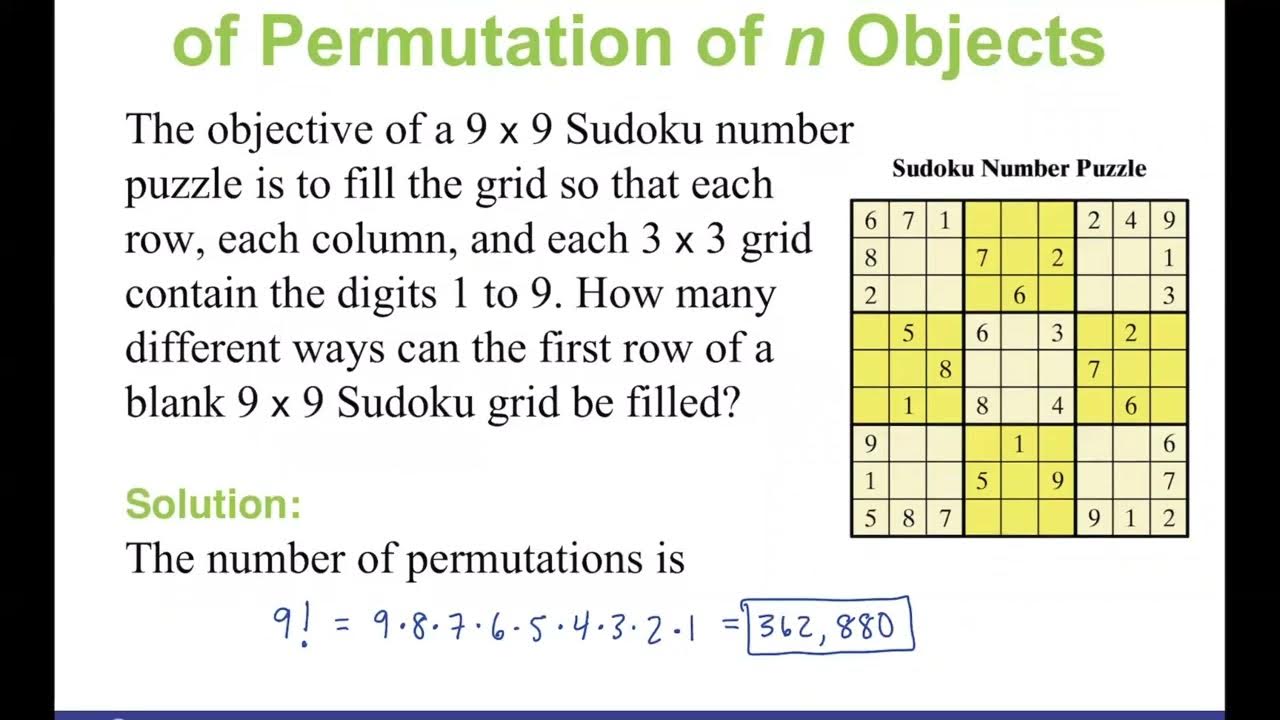Permutations
Summary
TLDRThis script introduces permutations as ordered arrangements of distinct objects. It explains how to calculate the number of permutations for different lengths using the basic counting principle, leading to the concept of factorials. The script further discusses permutations of varying lengths from a set of letters, introduces the notation nPk for permutations of length k from n items, and applies these concepts to real-world scenarios like committee selection and art exhibitions.
Takeaways
- 🔑 A permutation is an ordered arrangement of distinct objects.
- 🔑 The number of permutations of length three from three distinct letters is calculated as 3 factorial (3!).
- 🔑 The number of permutations of length four from four distinct letters is calculated as 4 factorial (4!).
- 🔑 The general formula for permutations of length n from n distinct letters is n factorial (n!).
- 🔑 For permutations of length k from n distinct letters, the formula is nPk, which is the product of n down to (n-k+1).
- 🔑 The permutation rule, nPk, is used to calculate the number of ways to choose k items from n distinct items where order matters.
- 🔑 When the length of the permutation equals the number of available letters, the formula simplifies to n factorial (n!).
- 🔑 The special permutation rule is used when the number of items to arrange is equal to the number of available items.
- 🔑 Permutations are a fundamental concept in combinatorics, useful for problems involving ordered selections.
- 🔑 Practical applications of permutations include selecting committee members with distinct roles or arranging items in order, such as pieces of art for an exhibition.
Q & A
What is a permutation?
-A permutation is an ordered arrangement of distinct objects.
How many permutations of length three can be made from three distinct letters?
-There are 3 factorial (3!) permutations of length three from three distinct letters.
What is the total number of permutations of length four from four distinct letters?
-There are 4 factorial (4!) permutations of length four from four distinct letters.
What is the general formula for the number of permutations of length n from n distinct letters?
-The total number of permutations is n factorial (n!).
How many permutations of length two can be made from five distinct letters?
-There are 5 times 4, or 20, permutations of length two from five distinct letters.
How many permutations of length three can be made from five distinct letters?
-There are 5 times 4 times 3, or 60, permutations of length three from five distinct letters.
What does the notation nPk represent?
-nPk represents the number of permutations of length k from n distinct letters.
What is the formula for calculating nPk?
-The formula for calculating nPk is n * (n - 1) * (n - 2) * ... * (n - k + 1).
What is the special permutation rule when the length of a permutation is the same as the number of available letters?
-The special permutation rule is nPn, which is equivalent to n factorial (n!).
How many ways are there to select three people out of six for a committee with distinct roles?
-There are 6P3 ways to select three people out of six for a committee with distinct roles.
How many ways are there to select five pieces of art out of nine for an exhibition where the order matters?
-There are 9P5 ways to select five pieces of art out of nine for an exhibition where the order matters.
Outlines

This section is available to paid users only. Please upgrade to access this part.
Upgrade NowMindmap

This section is available to paid users only. Please upgrade to access this part.
Upgrade NowKeywords

This section is available to paid users only. Please upgrade to access this part.
Upgrade NowHighlights

This section is available to paid users only. Please upgrade to access this part.
Upgrade NowTranscripts

This section is available to paid users only. Please upgrade to access this part.
Upgrade Now5.0 / 5 (0 votes)





